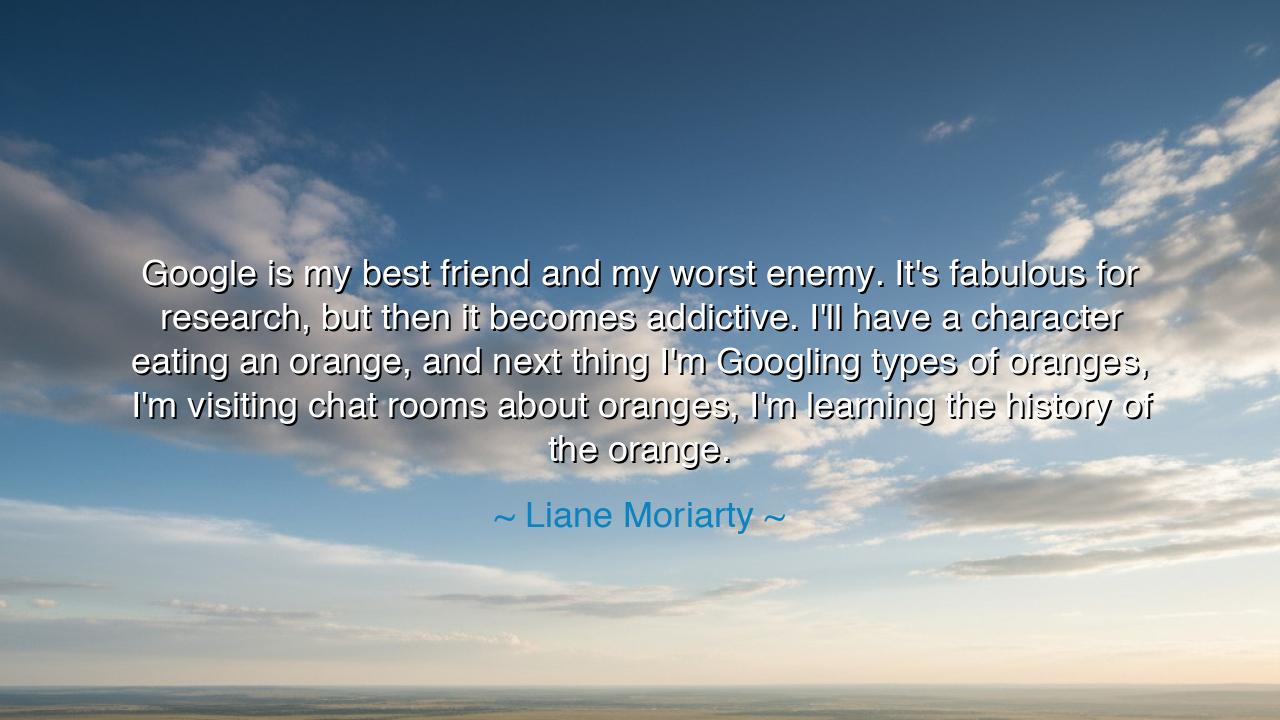
Google is my best friend and my worst enemy. It's fabulous for
Google is my best friend and my worst enemy. It's fabulous for research, but then it becomes addictive. I'll have a character eating an orange, and next thing I'm Googling types of oranges, I'm visiting chat rooms about oranges, I'm learning the history of the orange.






When Liane Moriarty confessed, “Google is my best friend and my worst enemy. It’s fabulous for research, but then it becomes addictive. I’ll have a character eating an orange, and next thing I’m Googling types of oranges, I’m visiting chat rooms about oranges, I’m learning the history of the orange,” she was speaking to one of the great paradoxes of our age — the tension between knowledge and distraction, between the hunger for truth and the endless labyrinth of curiosity. Her words carry both humor and warning: that the same tool which grants us infinite wisdom can also steal from us the sacred silence required to create, to think, to be. In this, she joins the long tradition of wise voices who have warned that power without discipline becomes its own prison.
In the world of the ancients, there were libraries that mirrored this temptation. The Library of Alexandria, vast and unmatched, contained scrolls from every corner of civilization. Scholars traveled for months to study there, yet even among such treasures, there were those who lost themselves in endless study, drowning in abundance rather than drinking from it. Knowledge, as the philosophers taught, is a flame — it can illuminate or consume. Moriarty’s “Google” is our modern Alexandria, infinite and unbounded, yet lacking walls to contain our wandering minds. We reach for a single fact, and the current of curiosity pulls us farther, deeper, until we forget why we began.
Her words also speak to the artist’s struggle — the fine balance between research and imagination. A novelist begins with a spark: a character, an image, a whisper of story. But the world, with all its glittering information, calls her outward. She begins searching for authenticity — the right type of orange, the right shade of sky, the right tone of dialogue — and soon the search becomes endless. What began as a journey toward truth becomes an escape from creation itself. This is the subtle seduction of knowledge in excess: it feels like progress, yet it can quietly kill the moment of inspiration.
There is an ancient story of Odysseus, the wandering hero, who sought to return home after war but was drawn by sirens’ song into peril. The sirens of the digital age sing through hyperlinks and search results, promising wisdom yet leading us further from our purpose. Like Odysseus, the modern seeker must bind themselves — not to the mast of a ship, but to the discipline of focus. For even good intentions can become traps when curiosity loses direction. Moriarty’s “addiction” is not one of vice, but of overindulgence in the beautiful — and that is the most dangerous kind of all.
Yet, we must not misunderstand her confession as a rejection of technology or learning. Her tone is that of affection mixed with caution — for she calls Google both her best friend and worst enemy. The ancients would recognize this duality, for every divine gift bore its curse. Prometheus, who gave fire to humanity, gave both warmth and destruction. Hermes, god of knowledge and communication, also brought deceit and mischief. So it is with Google — it is the modern fire, a source of endless illumination that, if left untamed, can burn through our time, our focus, our peace.
Moriarty’s insight is deeply human: we crave meaning, and in our search for it, we sometimes mistake information for wisdom. The flood of data dazzles us, but true understanding grows only in stillness. The writer, the thinker, the dreamer — all must learn when to stop searching outward and begin searching inward. The ancients practiced this through meditation and silence, stepping away from the clamor of the world to listen for the quiet voice within. In our own time, to close the browser and return to the blank page is an act of courage — a reclaiming of one’s inner temple.
So, the lesson of Moriarty’s reflection is this: use knowledge as a tool, not a master. Let curiosity be your guide, but do not let it become your cage. The mind, like a river, must flow — but it must also rest in its banks, lest it flood and lose itself. Learn when to seek, and when to simply be. For creation is not born from the endless gathering of facts, but from the stillness where imagination breathes.
Therefore, my children, remember this wisdom: the world will always tempt you with more — more knowledge, more noise, more light — but the true artist, the true thinker, knows when to turn away. Master the flame, and it will warm your path. Let it master you, and it will consume your time, your peace, and your voice. Like Moriarty, laugh at your own distractions, but do not dwell in them. Return, again and again, to the purpose that called you — and in that quiet devotion, you will find both truth and creation.






AAdministratorAdministrator
Welcome, honored guests. Please leave a comment, we will respond soon